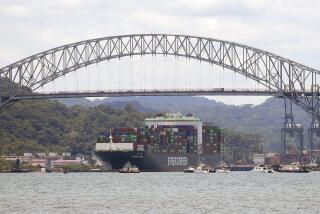Onetime journalist wrote about U.S. foreign policy, then helped craft it
- Share via
William Jorden, a former New York Times reporter who became a State Department specialist on the Vietnam War as well as U.S. ambassador to Panama, and who wrote a definitive account of the 1978 Panama Canal treaty negotiations, died of lung cancer Friday at a nursing care facility in New Bedford, Mass. He was 85.
Jorden joined the New York Times in 1952 and reported from Japan and Korea. While chief of its Moscow bureau, he was part of the Times team that won the 1958 Pulitzer Prize for international reporting.
He was the paper’s Washington, D.C.-based diplomatic correspondent before joining the State Department’s Policy Planning Council in 1961, hoping to contribute to U.S. policies rather than reporting on them, his family said.
Jorden soon became special assistant to W. Averell Harriman, then undersecretary of State for political affairs, and was responsible for keeping Harriman informed of the escalating conflict in Southeast Asia.
Among his duties, Jorden played a key role drafting the administration’s position on Vietnam. David Halberstam’s book about U.S. involvement in the region, “The Best and the Brightest,” described Jorden as a leading early skeptic of the likelihood of rapid American military success in Vietnam. He reported back to his bosses about violent protests against Ngo Dinh Diem, the South Vietnamese president aligned with the United States who would be killed during a coup in 1963.
Halberstam wrote that Jorden had “warned against the United States’ becoming too closely identified ‘with a man or a regime.’ ”
In the late 1960s, Jorden was a member of the National Security Council and served as a member and spokesman for the U.S. delegation to the Vietnam peace talks in Paris.
He briefly left the National Security Council to help former President Lyndon B. Johnson write “The Vantage Point,” memoirs of the foreign and domestic crises of his White House years.
In 1972, national security advisor Henry Kissinger invited Jorden to rejoin the National Security Council as its Latin American expert. First appointed by President Nixon, Jorden then served as U.S. ambassador to Panama from 1974 to 1978.
In Panama City, he was involved in the acrimonious treaty negotiations and helped shepherd the treaties through Congress that eventually ceded U.S. control over the waterway. He wrote a firsthand account of his involvement with the treaty negotiations, published in 1984 as “Panama Odyssey,” which critics called comprehensive -- sometimes to a fault.
In a review of the book, New York Times reporter Bernard Gwertzman, a foreign policy specialist, wrote, “Jorden could probably have used a good editor to cut away excess anecdote and detail,” but also upheld the book’s importance, calling it “the ‘sleeper’ book of the year, which gives the reader one of the rare opportunities to be invited into a crucial set of negotiations.”
William John Jorden was born May 3, 1923, in Bridger, Mont., and studied Japanese at Yale University and the University of Michigan while serving in the Army during World War II. He was a 1947 Yale graduate and earned a master’s degree in journalism at Columbia University in 1948.
After an early reporting career for the Vineyard Gazette in Edgartown, Mass., and the New York Herald Tribune, he won a Pulitzer traveling fellowship from Columbia and became a correspondent for the Associated Press in the Far East. He moved to Massachusetts from his longtime home in McLean, Va., in 2007.
His marriage to Eleanor Harz Jorden ended in divorce. Survivors include his wife of 38 years, Mildred Xiarhos Jorden of North Dartmouth, Mass.; three children from his first marriage; and six grandchildren.
--
Wiseman writes for the Washington Post.
--
More to Read
Sign up for Essential California
The most important California stories and recommendations in your inbox every morning.
You may occasionally receive promotional content from the Los Angeles Times.













